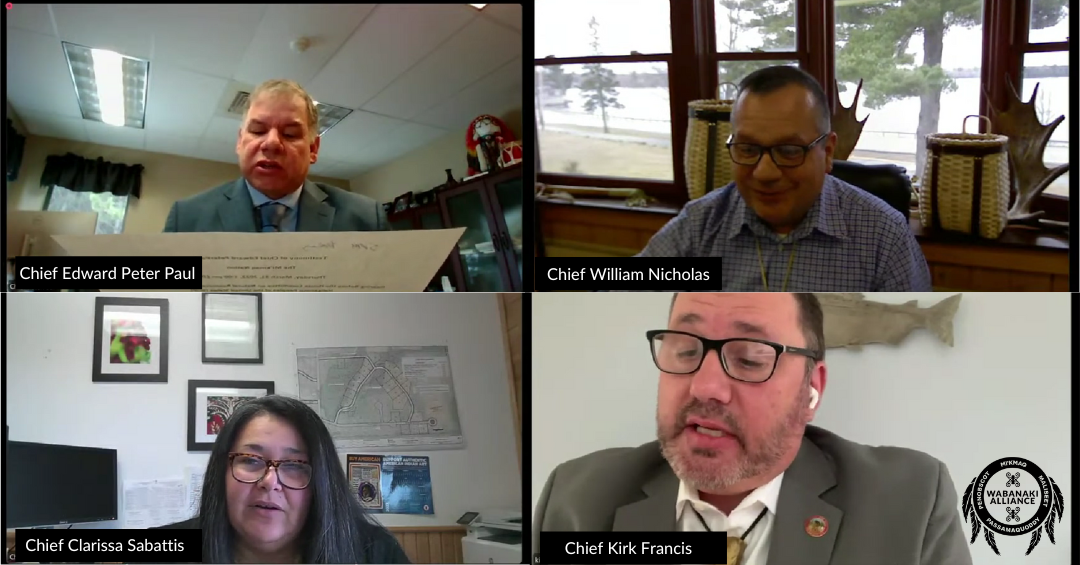(L-R) Chief Edward Peter Paul, Mi’kmaq Nation; Chief William Nicholas, Passamaquoddy Tribe at Motahkmikuk; Chief Clarissa Sabattis, Houlton Band of Maliseet Indians; and Chief Kirk Francis, Penobscot Nation deliver testimony before a Congressional subcommittee in March.
Jump to: The Issue | Take Action | Talking Points
QUICK TAKE
Earlier this year, Rep. Jared Golden introduced HR 6707, a bill to amend the 1980 Maine Indian Claims Settlement Act so that the Wabanaki tribes can benefit from future federal laws that apply to 570 other federally recognized tribes. The measure was ultimately added on to another bill and passed the House with bipartisan support. It awaits action in the Senate.
THE ISSUE
Because of the 1980 Maine Indian Claims Settlement Act (MICSA), federal Indian laws that benefit all other federally recognized tribes can only apply to Maine if Congress includes an explicit stipulation in the legislation. Enacted in 1980, MICSA extinguished the legal claims of the Passamaquoddy Tribe, Penobscot Nation, and Houlton Band of Maliseet Indians to their historic lands in Maine in exchange for trust funds to allow the tribes to purchase lands and provide general revenue and old-age pensions to their citizens. In addition, MICSA ratified the state-level Maine Implementing Act, which extended state civil and criminal jurisdiction over the tribes. Notably, MICSA also blocked federal laws that benefit Indians from applying to tribes in Maine if the State of Maine claimed the federal law would affect the application of state law, with limited exceptions. As a result, tribes in Maine have been unable to benefit from more than 151 federal laws passed since 1980, including legislation meant to improve public health, respond to natural disasters, promote economic development, and protect the environment.
Earlier this year, Rep. Jared Golden (ME-2) introduced the Advancing Equality for Wabanaki Nations Act (HR 6707), a bill co-sponsored by Rep. Chellie Pingree (ME-1) that would amend MICSA and fix this decades-long injustice. The bill would extend all future federal Indian laws to the Wabanaki tribes and allow the Indian Child Welfare Act (ICWA) to apply to the Houlton Band of Maliseet Indians and the Mi’kmaq Nation in the same way that the law currently applies to the Penobscot Nation and Passamaquoddy Tribe under MICSA. The chiefs of the four Wabanaki Nations testified in support of the bill before the Subcommittee for Indigenous Peoples of the House Natural Resources Committee in March (watch the hearing here) and nearly 2,000 Mainers submitted letters of support to the committee (read some here). The committee advanced the bill to the full House in June. In a welcomed surprise move, the measure was later included in an amendment package in July to the National Defense Authorization Act, which passed with broad bipartisan support. That bill now awaits action in the Senate. Sen. Susan Collins has not made her position public but Sen. Angus King has said he opposes it.
WHAT CAN YOU DO?
-
- Ask Collins and King to support the measure. Send emails to King and Collins urging them to support legislation that puts Wabanaki tribes on equal footing as all other federally recognized tribes. Make your message as personal as possible and explain why passing this measure is important to you. Find Sen. King’s email here and Sen. Collins’ email here.
-
- Sign a petition to Sen. King. Sen. King has voiced opposition to this measure. Sign a petition telling him that Wabanaki nations deserve access to all future federal laws that are passed by Congress for the benefit of tribal nations. Sign that petition here.
-
- Write a letter to the editor. Turn your email into a letter to the editor! LTEs can be an effective way to demonstrate public support for legislation. Find tips and a list of Maine newspapers and contact info in our LTE Guide.
KEY TALKING POINTS
- The bill has received broad bipartisan support from legislators in the Maine House and Senate, and from members of Maine’s forest products industry.
- The U.S. Department of the Interior supports the bill.
- Since 1980, the Wabanaki tribes have been excluded from at least 151 federal laws that would have supported tribal citizens, including legislation meant to improve public health, respond to natural disasters, promote economic development, and protect the environment. (See specific examples below.)
- This legislation would put the Wabanaki on equal footing as all other federally recognized tribes after 40 years of second-class treatment.
- Wabanaki nations in Maine should not be the only Indigenous Peoples in the country excluded from federal legislation that is specifically meant to address their needs.
- Passing this legislation would represent a significant step toward equalizing the federal treatment of Wabanaki nations with that of tribes in the rest of the country. This legislation is supported by all of the Wabanaki nations in Maine.
- There are strong precedents for supporting this bill. Congress has enacted amendments to settlement acts multiple times in recent decades. And in 1983, Congress even amended MICSA itself.
- While this would only affect Wabanaki nations in Maine, the entire federal government, including Congress, has a trust responsibility to these tribes.
- Examples of federal laws that have excluded Wabanaki nations in Maine since 1980 include:
- The Stafford Act. The Stafford Act makes funds available to tribes that declare a state of emergency in response to natural disasters or public health emergencies. Wabanaki nations have been denied direct access to Stafford Act funds, including access to resources to address the opioid epidemic in their communities.
- Violence Against Women Act (VAWA). VAWA permits tribes to arrest and prosecute non-Indians who commit certain domestic violence crimes in tribal communities. The Wabanaki nations fought for years to use VAWA to enhance public safety but VAWA implementation was blocked in Maine until a new state law was passed after significant and lengthy negotiations between tribal and state parties.
- Indian Health Care Improvement Act (IHCIA). Permanently authorized in 2010 as part of the Affordable Care Act, the IHCIA included a provision to improve the ability of tribal governments to recruit licensed medical professionals to work in tribal health centers. The provision was included in the IHCIA to combat the challenges that tribes face in trying to recruit medical professionals in rural and often isolated tribal communities. The State of Maine has sought to prevent Wabanaki nations from recruiting licensed medical professionals under this law.
- Environmental Protection Laws. Through the Clean Water Act and the Clean Air Act, Congress has authorized Indian tribes to assume primary regulatory authority for administering federal environmental programs on Indian lands. The Wabanaki nations have been the vanguards of environmental stewardship in Maine for generations, as reflected through more recent efforts to promote higher water quality, to ensure clean drinking water, and to restore wildlife and marine resource habitats. These efforts have been routinely stymied due to court battles over the extent to which Wabanaki tribes can access federal laws aimed at enhancing the ability of tribes to protect the environment.





